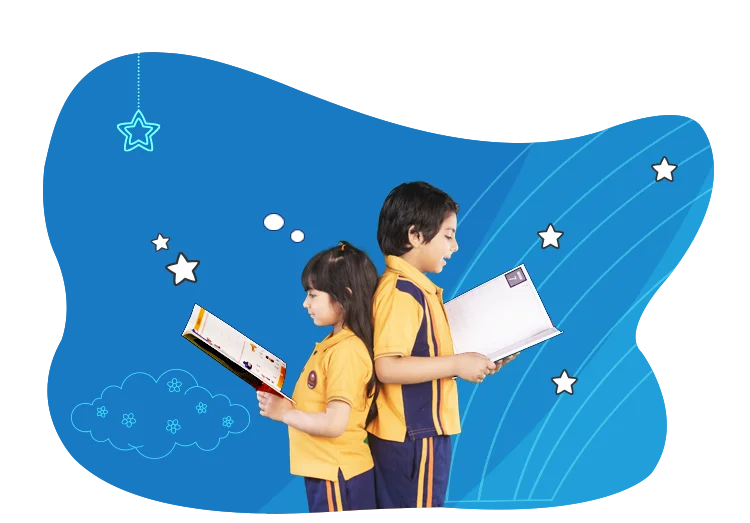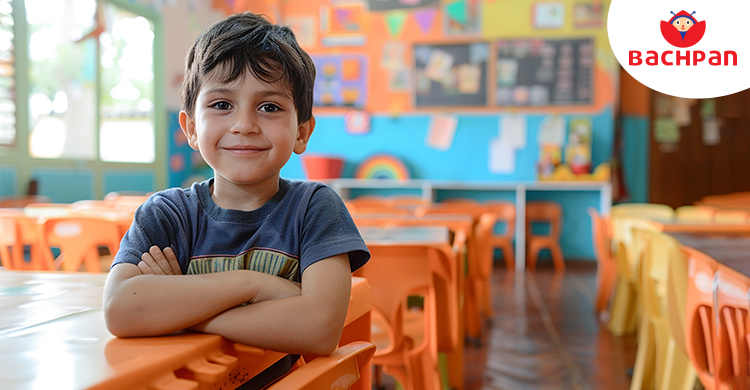Surprising Facts & Scenario Of Preschool Education In India

Do you know that 90% of the brain develops by the age of five? Hence, these five years become very crucial for the child. Preschool education in India plays a key role during this critical period by stimulating cognitive, emotional, and social development through structured play, interaction, and exploration. Activities in preschools help shape neural connections, build early language and numeracy skills, and nurture curiosity, laying the groundwork for lifelong learning.
What is Preschool Education?
The early childhood education that children get before starting formal schools, usually between the ages of two and six, is referred to as preschool education. It emphasises basic development through play, engagement, and structured activities, assisting kids in acquiring essential motor, social, emotional, and literacy skills in a supportive, child-friendly environment.
Importance of Early Childhood Education
During childhood years, children’s brains are like sponges, which help absorb new experiences and information at a remarkable rate. It is also a critical period of brain development, which brings rapid cognitive, physical, and emotional growth for a child. This leads the way for greater learning capabilities. Nurturing a developing child through early childhood education programs and educators proves invaluable during this critical time.
Growth of Preschool Education in India
Early childhood education in India has gained significant prominence in recent years. It is evolving with a clear shift from teacher-centric instruction to child-centric, play-based learning. Modern classrooms now focus on holistic development—fostering curiosity, creativity, and foundational skills. This transformation reflects a growing understanding of the importance of early years in shaping thinking, behaviour, and lifelong learning habits.
Key Facts About Preschool Education in India
Regarding preschool education in India, there are a few noteworthy and interesting details. The impact of technology, the function of private preschool chains, and several other aspects will be covered in this part. Let’s get started now!
Growth of Preschool Enrollment in India
Pre-school enrollment is rapidly growing, due to increasing parental awareness about the importance of preschool education in India. National Education Policy (NEP 2020) opened new opportunities for building strong foundations for children’s education in India by promoting play-based learning, universal access, and early literacy goals. This shift, combined with growing demand for quality early learning, has resulted in a steady increase in enrollment.
Government Initiatives for Early Education
The government has introduced numerous initiatives over the years to promote early education. Notable among these are NEP 2020, Samagra Shiksha, and the National Early Childhood Care and Education (ECCE) policy, which highlight the importance of foundational learning, nutrition, and holistic development. These initiatives aim to ensure that every child receives quality preschool education.
Role of Private Preschool Chains
While government programs such as ECCE (Early Childhood Care Education) under NEP 2020 (National Education Policy) seek to make preschool education accessible to everyone, private preschool chains aid in bridging access and infrastructure gaps. They assist India’s objective of providing high-quality early education for everyone by providing structured programs, teacher training, and early learning materials. Leading chains like Bachpan are not only expanding in cities but also rural areas.
👉 Learn how you can open your own preschool with Bachpan’s trusted franchise model.
Influence of Technology in Preschool Learning
Whether we like it or not, technology plays an integral part in our lives. It is reshaping early childhood education by making learning more interactive, personalised, and engaging. Tools like learning apps, smartboards, and tablets are being used to enhance motor skills, language development, and problem-solving abilities.
Importance of Play-Based Learning
Play-based learning fosters creativity and imagination among children. It also develops cognitive skills as their thinking ability enhances. They learn to communicate, share, and collaborate with others, through which their social and emotional development also takes place. As they have the autonomy to explore their interests and pursue activities that engage them, it encourages independence and self-awareness.
Changing Trends in Preschool Education
Nowadays, preschool education in India extends beyond providing academic knowledge to children. They now also emphasise a child’s holistic development. Let’s check out the trends the preschools are adopting.
Shift from Traditional to Modern Teaching Methods
The process of teaching has undergone significant transformation over the years. Modern, student-centered teaching strategies that emphasise critical thinking, creativity, and active engagement replaced traditional techniques like rote memorisation and one-way lecturing. Many schools now incorporate science, technology, engineering, arts, and math (STEAM) activities to ignite curiosity and critical thinking among children. Social Emotional Learning (SEL) is also now prioritised for building emotional intelligence and helping children achieve long-term success.
Integration of Digital Learning
Technology is making lessons more visual, personalised, and engaging. This is evidence that digital learning is revolutionising the way children engage with education. Animated stories, virtual labs, education games, and other digital tools help children grasp concepts faster and retain them longer. Additionally, it facilitates cooperation, raises digital literacy, and gives teachers access to real-time data so they can monitor student progress.
Digital tools work best when combined with foundational literacy approaches.
👉 Explore fun and easy ways to teach phonics alongside digital learning.
Increased Parental Awareness
Parents today are more involved and knowledgeable than ever before. They actively seek out holistic, child-centric education that fosters both academic and emotional growth as they have access to research, professional advice, and real-time school updates. In addition to reading and writing, parents increasingly place a higher value on schools that emphasise creativity, life skills, and overall wellbeing.
Holistic Development Approach
These days, education is more than just books and whiteboards. A child’s mind, body, and heart are nurtured by a holistic development strategy, which emphasises academic success as well as emotional, social, physical, and creative development. Preschool activities aim to develop resilience, empathy, curiosity, and confidence in kids, preparing them for life beyond school.
Challenges in Preschool Education in India
Though preschool education in India has progressed over the years, it still faces some challenges. Let’s go through these challenges.
Accessibility and Affordability Issues
In many regions of India, access and affordability continue to be significant obstacles, despite the growing importance of early childhood education. Due to the concentration of high-quality preschools in metropolitan areas, low-income and rural families have little to no access to them. Even in urban areas, many people cannot afford quality education due to growing expenses for tuition and additional activities, digital tools, and transportation.
Need for Standardized Curriculum
India’s wide sociocultural diversity, inexperienced teachers, and a lack of regulations is contributing to the uneven quality of preschool education in the nation. Inconsistent learning experiences are the result of these gaps. A standardised curriculum is necessary to ensure that all children receive fair and excellent early education.
Training and Development of Teachers
Inadequate teacher training is a major challenge faced by preschools in India. Many educators lack formal credentials in early childhood education, affecting overall quality. Without ongoing, NEP-aligned professional development, the sector struggles to offer holistic learning—hindering preschoolers’ foundational development and readiness for the future.
Trained educators often use stories to instill values in preschoolers.
👉 Check out these best short moral stories for kids to support value-based learning.
Balancing Traditional and Digital Learning
Indian preschools struggle to strike a balance between traditional play-based methods and modern tools like apps and smart classes due to uneven access to technology and varied teacher training. When either is overused, holistic development may be hampered. It requires a careful blending of technology that enhances, rather than replaces, human interaction, and traditional methods without becoming rigid or outdated.
Future of Preschool Education in India
With an emphasis on holistic child development, creativity, inclusivity, and technology, preschool education in India is changing for the future. The importance of preschool education in India is now widely acknowledged, as it plays a crucial role in shaping the early learning experiences of children. Examine this section to learn how India’s preschool education is changing to accommodate the needs of a younger generation.
Role of Government and Private Sectors
Through initiatives supporting access, equity, and teacher preparation, as well as policies like NEP 2020, the government supports preschool education. In the meantime, the private sector makes contributions through scalable methods, digital technologies, and creative curriculum. When combined, they are essential to creating an inclusive, well-rounded, and future-ready early education system in India.
Advancements in Early Childhood Learning
Play-based approaches, individualised learning resources, and technological integration have significantly improved early childhood education. Learning is made interesting and meaningful by ideas like STEAM, social-emotional learning (SEL), and interactive digital content. These developments are changing the way that developing brains investigate, comprehend, and develop during their formative years.
Importance of Inclusive Education
The UN’s Sustainable Development Goal 4, which calls for inclusive, egalitarian education by 2030, is being actively pursued by India through NEP 2020. This is leading to the growth of inclusive education. This goal calls for preschools to use a variety of teaching approaches. This change indicates a time when kids of all skill levels will study together, developing empathy, self-assurance, and enduring social peace.
Strengthening Teacher Training Programs
High-quality preschool education is largely dependent on efficient teacher training programs. Government initiatives like DIKSHA (Digital Infrastructure for Knowledge Sharing) and NISHTHA (National Initiative for School Heads’ and Teachers’ Holistic Advancement) aim to enhance teaching skills, improve learning outcomes, and support modern teaching needs. Private institutions are adopting these efforts while adding workshops and mentorship programs as well. With future-ready training and technology, educators will be better equipped to foster holistic early childhood development.
FAQs About Preschool Education in India
A1: Preschool education in India is growing steadily, especially with the support of NEP 2020. However, access and quality still vary across regions.
A2: Early childhood education shapes cognitive, emotional, and social development, preparing children for formal schooling and lifelong learning.
A3: Key challenges include lack of trained teachers, uneven infrastructure, low awareness in rural areas, and affordability.
A4: Private chains like Bachpan Play School provide structured curriculums, modern classrooms, and franchising options that expand access across urban and rural regions.
A5: Digital tools enhance engagement, simplify concepts, and make personalized learning possible, especially in urban preschool environments.
Conclusion
Preschool education in India is changing significantly due to creativity, inclusion, and a better comprehension of the requirements of children. In order to foster well-rounded, future-ready students, the industry is evolving by incorporating technology and play-based learning, enhancing teacher preparation, and ensuring fair access. A more adaptable and comprehensive early education system is being shaped by a combination of government programs, private sector endeavours, and parental awareness. To learn more, visit us at https://www.bachpanglobal.com/.
As we move forward, rural India is also embracing change. If you’re inspired by this shift, check out the best preschool franchise in India to make a difference in your own community.







